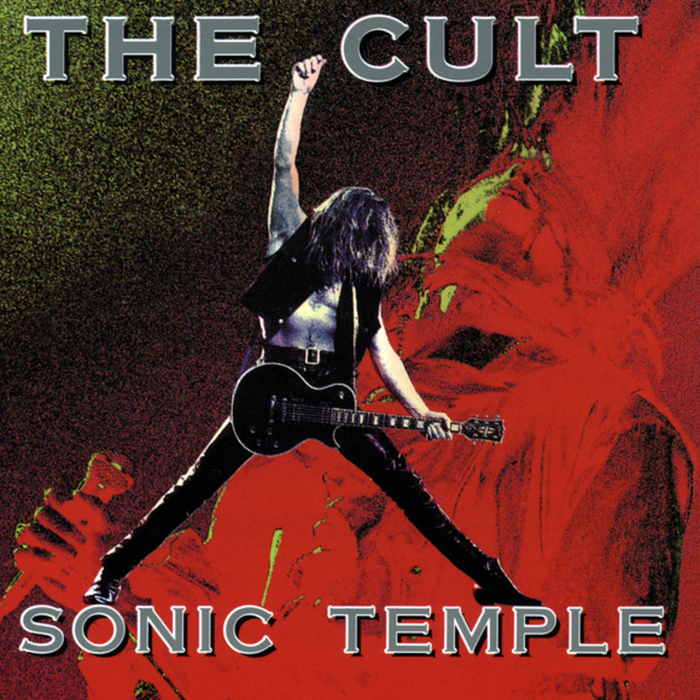Sonic Temple came at an interesting point in The Cult’s career. Having evolved from paisley-patterned goths, 1987’s Electric had seen them strip back their sound to brutal and basic biker-booted hard rock riffery. Having originally attracted as a post-punk act, going full on hard rock was an interesting evolutionary move, but one that had seen them avoid being lumped in with the New Wave of British Heavy Metal crowd, but still make promising inroads into the American rock market.
Sonic Temple was the next logical step in that evolution, as it adopted a shamelessly stadium rock sound, but stopped short of going full-on poodle-haired metal. There was just one problem. Touring buddies Guns n’ Roses had shook the heavy metal scene to the core and had made many of their contemporaries look hideously out of date. Would The Cult suffer the same fate? Comparisons would be inevitable, especially as they were often sharing the same stages at this point in their respective careers.
One the one hand, Sonic Temple is the sound of The Cult fully embracing the American market, on the other, there was still something defiantly British about them. While they hadn’t gone the pop-metal route of say Def Leppard or Bon Jovi, there was still something which gave them a commercial edge on songs like the opening double punch of “Sun King” and “Fire Woman”. Elsewhere, they shamelessly target their recently-won American fans on tunes like “American Horse” on which they use a thin metaphor for their attempts to conquer the US music market, and the equally blatant “New York City”, a gloriously upbeat slab of full-throttle rock.
Elsewhere The Cult attempt to channel Queen on “Edie (Ciao Baby)”, on which Ian Astbury does a solid impression of King Fred and the whole arrangement invites comparisons to one of Brian May’s multi-layered 80s efforts. Some Cult fans hate it to this day, but it inevitably brought in a wave of new fans when it was released as a single. If “Edie (Ciao Baby)” was The Cult’s equivalent of a power ballad, following track “Sweet Soul Sister” is no less accessible, despite it’s keyboard intro wrong-footing you until Billy Duffy’s riff spirals into your ears.
All of this makes for an enjoyable late 80s hard rock experience, and it’s no surprise that it is The Cult album which saw the greatest success on the other side of the Atlantic. That’s not to say that it doesn’t stumble into the same bear traps as the rest of the 80s rock community was at the time. At nearly an hour Sonic Temple is something of an endurance test to get through at times. The eleven song trackless doesn’t seem excessive, but often the run times break the five minute barrier when they really don’t have to. A bit of judicious editing would have resulted in a much more digestible album, and if I was being particularly ruthless, I would have probably told them to hold “Soul Asylum” back as a b-side.
The elongated run time means that the attention can have wandered by midway through the second half of the album, which given how much Sonic Temple loses focus, is perhaps no bad thing. While “New York City” is certainly one of the album’s finer moments, “Wake Up Time for Freedom” tries a little to too hard to sound contemporary, and “Medicine Train” brings the album to a close in a way which even now has me pondering if it could have been done in a slightly more satisfying manner.
With Sonic Temple, The Cult had become full-blown rock beasts, and like all great rock beasts, too much success led to a certain amount of complacency, and within the next three years The Cult, like so many of their contemporaries got swept away by the tidal wave of Grunge. Sonic Temple was therefore the commercial apex for Astbury, Duffy, Jamie Stewart and their bandmates. It would be the last album for Stewart, who would leave before 1991’s Ceremony, an album on which the band demonstrated that they had learned nothing from making Sonic Temple, as it was even longer and just a bit more generic sounding.
While a world away from 1984’s Dreamtime and 85’s Love, Sonic Temple was the last solid album The Cult would record before their initial dissolution in 1995. It’s an album that should be celebrated as a rocking alternative to the more ridiculous poodle-haired acts that were packing them into the stadiums Stateside. True, the likes of Guns n’ Roses and Metallica would always eclipse them, and ultimately Grunge would do the same, but that’s no reason not to celebrate Sonic Temple as a fine, if flawed, rock album.














No Comment